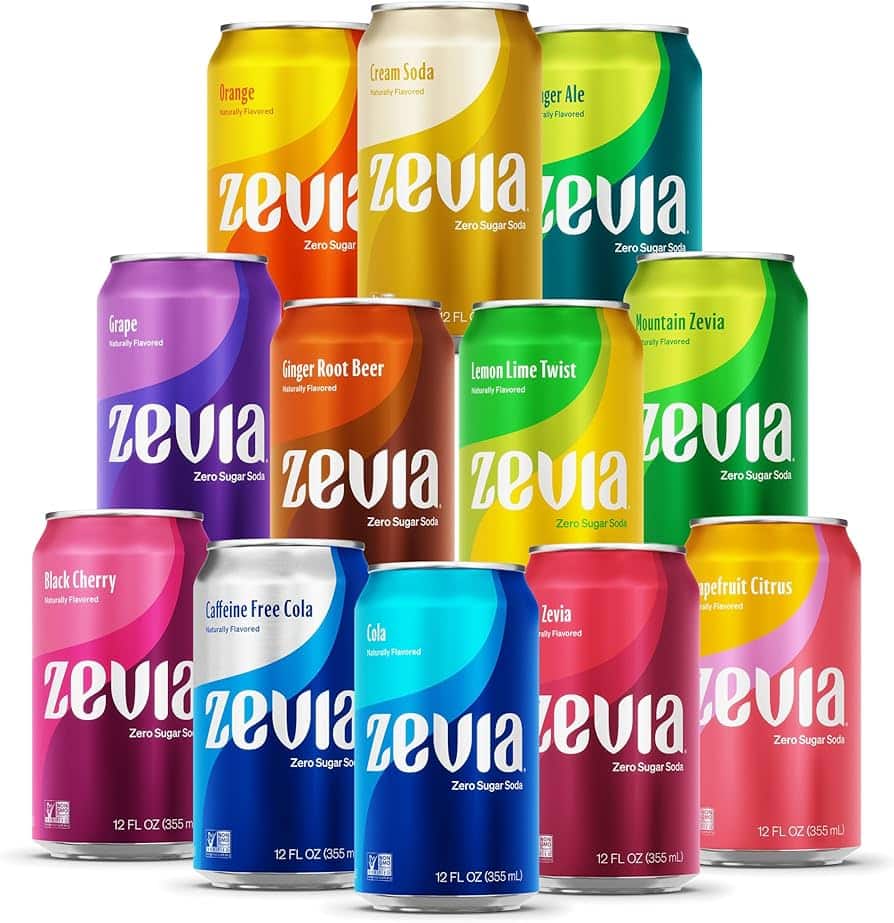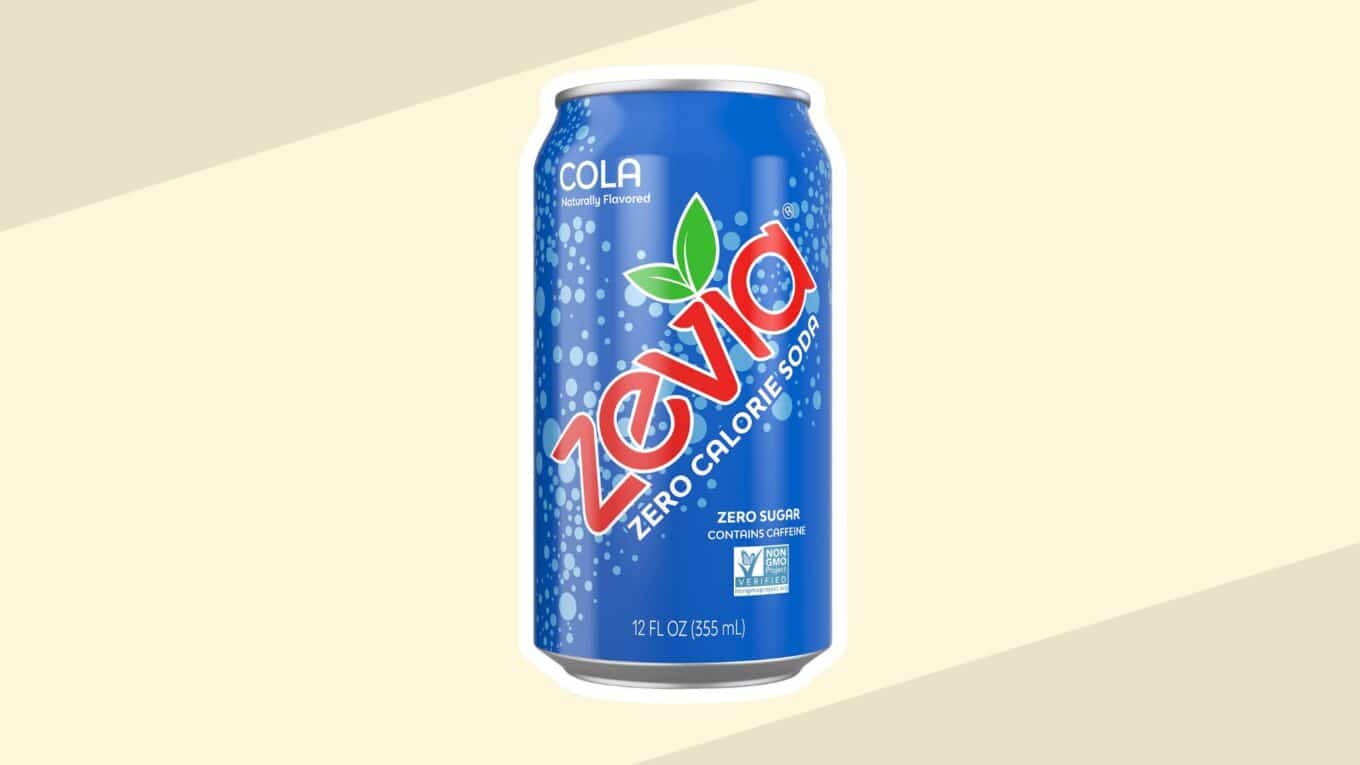Zevia, the popular zero-calorie soda sweetened with natural ingredients, has gained attention from health-conscious individuals seeking to manage their weight.
Many agree that finding a satisfying alternative to sugary drinks can be challenging to maintain a healthy lifestyle.
However, Zevia offers a promising solution for those looking to enjoy a refreshing beverage without the added calories and sugar in traditional sodas.
This article will explore how Zevia can be incorporated into a weight management plan, examining its unique properties and potential benefits.
We will also discuss important considerations and tips for maximizing Zevia to support healthy weight goals.
What is Zevia?

Zevia is a brand of carbonated soft drinks that positions itself as a healthier alternative to traditional sodas.
It stands out in the beverage market by being completely free from sugar and calories, making it an appealing choice for those seeking to manage their weight or reduce their sugar intake.
Essential Features of Zevia

1. No Sugars and No Calories
One of the most notable aspects of Zevia is its absence of sugars and calories.
Unlike conventional sodas, often laden with high-fructose corn syrup or other sweeteners, Zevia offers a refreshing drink experience without the added guilt or potential negative impact on weight management goals.
By eliminating these elements, Zevia allows individuals to enjoy the taste and fizz of soda while keeping their sugar and calorie intake in check.
2. Natural Sweeteners Used
At the heart of Zevia’s sugar-free and calorie-free formula lies stevia, a natural sweetener derived from the leaves of the Stevia rebaudiana plant.
This plant species, native to regions of South America, has been used for centuries as a sweetening agent due to its remarkable sweetness and non-caloric properties.
By relying on stevia as its primary sweetener, Zevia offers a more natural approach to sugar-free beverages. Many health-conscious consumers prefer stevia over artificial sweeteners due to its plant-based origin and long history of use.
Using stevia in Zevia appeals to those seeking a cleaner label and a more natural way to satisfy their sweet tooth.
Zevia’s Role in Weight Management
When managing weight, the role of zero-calorie sweeteners cannot be overstated.
By opting for beverages like Zevia, which utilizes these sweeteners instead of sugar, individuals can significantly reduce their daily caloric intake without sacrificing the enjoyment of a sweet and satisfying drink.
One of the primary ways Zevia supports weight management is by helping individuals maintain a caloric deficit.
Consuming fewer calories than the body burns is essential for losing weight. Replacing regular sodas, often loaded with calories, with Zevia can significantly contribute to this goal.
Consider this: a 12-ounce can of regular soda typically contains around 140 calories, primarily from added sugars. In contrast, the same serving size of Zevia has zero calories.
By making the switch, an individual could save hundreds of calories daily, depending on their soda consumption habits. Over time, these saved calories can increase and support weight loss efforts.
Practical Ideas for Incorporating Zevia into Your Weight Loss Plan

1. Replacing Regular Soda
One of the simplest and most effective ways to incorporate Zevia into a weight management plan is by using it as a direct replacement for regular soda.
Whenever you crave a sweet, fizzy drink, reach for a can of Zevia instead of a sugar-laden alternative.
This small change can significantly reduce daily calorie intake, supporting weight loss goals.
2. Managing Sweet Cravings
Zevia can also be a valuable tool for managing sweet cravings that often derail weight loss efforts.
When the desire for something sweet strikes, enjoying a Zevia can provide satisfying refreshments without the added calories of sugary snacks. By having Zevia readily available, you can make healthier choices in moments of temptation.
3. Balance and Moderation
While Zevia can help manage caloric intake, it’s important to remember that successful weight management requires a holistic approach.
Incorporating Zevia into a balanced diet emphasizing whole, nutrient-dense foods and regular physical activity is key to achieving sustainable results. Use Zevia as a tool to support your efforts, but don’t rely on it as the sole solution.
Nutritional Comparison: Zevia vs. Regular Soda
| Soda Brand | Calories | Artificial Sweeteners | Natural Sweeteners | Sugar |
|---|---|---|---|---|
| Zevia | 0 | None | Stevia | 0g |
| Coca-Cola | 140 | None | None | 39g |
| Pepsi | 150 | None | None | 41g |
| Diet Coke | 0 | Aspartame | None | 0g |
| Pepsi Max | 0 | Aspartame, Acesulfame K | None | 0g |
| Sprite | 140 | None | None | 38g |
Does Stevia Cause Weight Gain?
While stevia itself does not contain calories, the perception of consuming a “zero-calorie” sweetener might have psychological and physiological impacts on eating behaviors.
Some evidence suggests that people may compensate for the perceived calorie reduction by consuming more calories from other sources later.
This phenomenon, known as the “health halo effect,” occurs when individuals believe they are making a healthier choice by consuming a low-calorie or zero-calorie product.
This belief may lead them to justify indulging in other high-calorie foods or beverages, ultimately negating stevia’s potential weight management benefits.
Health Benefits of Choosing Zevia
1. Impact on Blood Sugar Levels
Zevia’s most significant benefit is its minimal impact on blood sugar levels.
Unlike regular sodas, which are loaded with sugar and can cause rapid spikes in glucose, Zevia is sweetened with stevia, a natural sweetener that doesn’t raise blood sugar.
This makes Zevia an appropriate choice for individuals with diabetes or those managing their glycemic control.
2. Cardiovascular Benefits
Reducing sugar intake by switching to beverages like Zevia may positively affect cardiovascular health. High sugar consumption has been linked to an increased risk of developing heart diseases such as hypertension and atherosclerosis.
By choosing Zevia over sugary drinks, individuals can lower their overall sugar intake, which may help reduce the strain on their cardiovascular system.
This simple change can be part of a heart-healthy lifestyle that includes a balanced diet, regular exercise, and stress management.
3. Dental Health
Sugary drinks are notorious for their negative impact on dental health.
The sugar in these beverages interacts with bacteria in the mouth, producing acid that erodes tooth enamel and increases the risk of cavities and tooth decay. Zevia, being a sugar-free alternative, can help mitigate these dental problems.
By choosing Zevia over sugary drinks, individuals can reduce their exposure to the harmful effects of sugar on their teeth, promoting better oral hygiene and reducing the likelihood.
4. Antioxidant Properties
Some studies suggest that stevia, the natural sweetener used in Zevia, possesses antioxidant properties.
Antioxidants help combat oxidative stress and inflammation in the body, which are linked to various chronic diseases.
While more research is needed to fully understand the extent of stevia’s antioxidant benefits, incorporating Zevia into your diet may provide an additional source of these protective compounds, contributing to overall health and well-being.
Potential Concerns and Side Effects of Zevia
1. Gastrointestinal Discomfort
Some individuals may experience gastrointestinal discomfort when consuming Zevia or other stevia products.
Symptoms such as bloating, nausea, or digestive issues can occur as a reaction to the natural sweetener or other ingredients in the beverage.
If you notice any persistent or severe gastrointestinal symptoms after consuming Zevia, it’s best to discontinue use and consult with a healthcare professional.
2. Allergic Reactions
Although rare, some individuals may experience allergic reactions to stevia, the natural sweetener in Zevia. Symptoms of an allergic reaction can include skin irritations, dizziness, or difficulty breathing.
3. Perception of Sweetness
Long-term consumption of highly sweetened products like Zevia may alter an individual’s taste preferences. Exposure to intense sweetness can increase the desire for sweet foods and impact overall dietary choices.
This highlights the importance of using Zevia and other sweetened beverages in moderation and not relying on them as the sole source of hydration or satisfaction.
Maintaining a diverse diet that includes a variety of flavors and nutrient-dense foods can help prevent an overreliance on sweet tastes.
Stevia vs. Other Artificial Sweeteners
| Sweetener | Caloric Content | Common Usage | Health Implications | Metabolic Effects |
|---|---|---|---|---|
| Stevia | Zero calories | Beverages, desserts, and a range of processed foods | Generally considered safe, some studies suggest potential antioxidant benefits. Rare allergic reactions. | There is no significant impact on blood glucose or insulin levels; there are potential benefits for glycemic control. |
| Aspartame | Very low calories | Diet sodas, sugar-free gums, and low-calorie desserts | Linked to controversy over potential neurological effects and cancer risk, though widely deemed safe by regulatory bodies. | It may have a minimal effect on blood sugar levels; some studies suggest possible appetite stimulation. |
| Sucralose | Zero calories | Sugar-free baking, no-calorie drinks, and health and fitness supplements | Considered safe for most populations, there are concerns about heat stability and the creation of potentially harmful compounds when heated. | Minimal to no effects on blood sugar and insulin levels; some animal studies suggest potential gut microbiota changes. |
| Saccharin | Zero calories | Tabletop sweeteners, diet sodas, and other low-calorie products | Once linked to bladder cancer in rats but later cleared for human use, it may cause allergic reactions in sensitive individuals. | Generally, it does not impact blood sugar control; some evidence suggests it may alter gut microbiota. |
| Acesulfame K | Very low calories | Diet foods and drinks, chewing gums, and gelatins | Considered safe but has been scrutinized for potential carcinogenic effects, additional research on long-term effects is needed. | Little to no effect on insulin and blood sugar levels; studies on long-term metabolic effects are inconclusive. |
Long-term Studies and Reviews

It is crucial to consider long-term observational studies and systematic reviews to understand stevia’s impact on weight.
These studies provide a broader perspective on the relationship between stevia consumption and weight management over an extended period.
While some long-term studies suggest that regular stevia consumption may be associated with lower body weight and reduced calorie intake, others have found no significant differences in weight outcomes between stevia users and non-users.
It is important to acknowledge that the existing research on stevia and weight management has limitations and gaps.
Many studies are short-term, have small sample sizes, or do not account for other factors influencing weight, such as overall diet quality and physical activity levels.
As with any dietary component, the impact of stevia on weight management is likely to be influenced by a complex interplay of individual factors, including genetics, lifestyle habits, and overall dietary patterns.
Final Words
Zevia offers a promising option for those looking to manage their weight without sacrificing the enjoyment of a sweet, refreshing beverage.
By understanding the role of stevia, its potential benefits, and how to incorporate Zevia into a balanced lifestyle, individuals can make informed choices that support their weight management goals.
While more research is needed to fully understand the long-term effects of stevia on weight and overall health, current evidence suggests that Zevia can be a valuable tool in the journey toward a healthier, happier you.
As with any dietary change, it’s essential to approach Zevia as part of a holistic wellness plan that includes nutrient-rich foods, regular physical activity, and mindful consumption habits.
So, why not try Zevia and discover how this naturally sweetened beverage can support your weight management journey?
Frequently Asked Questions
Is Zevia Good for Gut Health?
Zevia contains natural sweeteners and no artificial colors, potentially better for gut health than sugary sodas. Still, it lacks probiotics beneficial for digestive wellness.
Why was Stevia Banned in Europe?
Stevia was temporarily banned in Europe due to a lack of safety data, but it was approved for use as a food additive in 2011 after further research.
Is Zevia Soda All-Natural?
Zevia soda is not entirely natural as it contains some processed ingredients, but it uses natural sweeteners like stevia and does not contain artificial colors or flavors.




